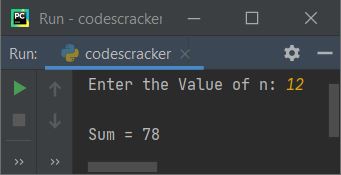- Python Basic Programs
- Python Program Examples
- Python Print Hello World
- Python Get Input from User
- Python Add Two Numbers
- Add Subtract Multiply Divide
- Python Check Even or Odd
- Python Check Prime or Not
- Python Check Alphabet or Not
- Python Check Vowel or Not
- Python Check Leap Year or Not
- Check Reverse equal Original
- Check Positive Negative Zero
- Python Check Armstrong or Not
- Python Check Palindrome or Not
- Python Check Perfect Number
- Python Find Reverse of Number
- Python Count Digits in Number
- Python Add Digits of Number
- Sum of First and Last Digits
- Python Product of Mid Digits
- Sum of Squares of Digits
- Interchange Digits of Number
- Python Sum of n Numbers
- Python Print ASCII Values
- Python Swap Two Numbers
- Python Swap Two Variables
- Python Fahrenheit to Celsius
- Python Celsius to Fahrenheit
- Python Display Calendar
- Python Days into Years, Weeks
- Find Largest of Two Number
- Find Largest of Three Number
- Python Print Fibonacci Series
- Generate Armstrong Numbers
- Python Make Simple Calculator
- Python Add Binary Numbers
- Binary Number Multiplication
- Python Mathematical Programs
- Find Sum of Natural Numbers
- Find Average of n Numbers
- Python Print Multiplication Table
- Print Table using Recursion
- Python Find Average Percentage
- Python Find Grade of Student
- Find Square Root of Number
- Python Print Prime Numbers
- Find Numbers Divisible by
- Python Find Factors of Number
- Python Find Factorial of a Number
- Python Find HCF & LCM
- Python Kilometres to Miles
- Python Find Area of Square
- Python Find Area of Rectangle
- Python Find Area of Triangle
- Python Find Area of Circle
- Python Find Perimeter of Square
- Find Perimeter of Rectangle
- Python Find Perimeter of Triangle
- Find Circumference of Circle
- Python Simple Interest
- Python Solve Quadratic Equation
- Python Different Set of Operations
- Python Display Powers of 2
- Python Find nCr & nPr
- Python Pattern Programs
- Python Print Pattern Programs
- Python Print Diamond Pattern
- Python Print Floyd's Triangle
- Python Print Pascal's Triangle
- Python List Programs
- Python Count Even/Odd in List
- Python Positive/Negative in List
- Python Even Numbers in List
- Python Odd Numbers in List
- Python Sum of Elements in List
- Sum of Odd/Even Numbers
- Python Element at Even Position
- Python Element at Odd Position
- Python Search Element in List
- Python Largest Number in List
- Python Smallest Number in List
- Python Second Largest in List
- Python Second Smallest in List
- Python Insert Element in List
- Python Delete Element from List
- Python Multiply Numbers in List
- Swap Two Elements in List
- Python 1D Array Program
- Python Linear Search
- Python Binary Search
- Python Insertion Sort
- Python Bubble Sort
- Python Selection Sort
- Remove Duplicates from List
- Python Reverse a List
- Python Merge Two List
- Python Copy a List
- Python Conversion Programs
- Python Decimal to Binary
- Python Decimal to Octal
- Python Decimal to Hexadecimal
- Python Binary to Decimal
- Python Binary to Octal
- Python Binary to Hexadecimal
- Python Octal to Decimal
- Python Octal to Binary
- Python Octal to Hexadecimal
- Python Hexadecimal to Decimal
- Python Hexadecimal to Binary
- Python Hexadecimal to Octal
- Python Matrix Programs
- Python Add Two Matrices
- Python Subtract Two Matrices
- Python Transpose Matrix
- Python Multiply Matrices
- Python String Programs
- Python Print String
- Python Find Length of String
- Python Compare Two Strings
- Python Copy String
- Python Concatenate String
- Python Reverse a String
- Python Swap Two Strings
- Python Uppercase to Lowercase
- Python Lowercase to Uppercase
- Python Check Substring in String
- Python Count Character in String
- Count Repeated Characters
- Python Count Word in Sentence
- Python Count Each Vowels
- Python Capitalize Character
- Python Capitalize Word in String
- Python Smallest/Largest Word
- Remove Spaces from String
- Remove Duplicate Character
- Remove Vowels from String
- Remove Punctuation from String
- Python Remove Word in String
- Python Remove Duplicate Words
- WhiteSpace to Hyphens
- Replace Vowels with Character
- Replace Character in String
- Python Sort String in Alphabetical
- Sort Word in Alphabetical Order
- Extract Number from String
- Python Check Anagram Strings
- Python File Programs
- Python Read a File
- Python Write to File
- Python Append Text to File
- Python Copy Files
- Python Merge Two Files
- Python Counts Characters in File
- Python Count Words in File
- Python File Content in Reverse
- Python Lines Contains String
- Python Delete Line from File
- Python Capitalize Word in File
- Python Replace Text in File
- Replace Specific Line in File
- Python Find Size of File
- Python List Files in Directory
- Python Delete Files
- Python Misc Programs
- Python Reverse a Tuple
- Python Merge Two Dictionary
- Python bytes to String
- Python bytearray to String
- Generate Random Numbers
- Python Print Address of Variable
- Python Print Date and Time
- Python Get IP Address
- Python Shutdown/Restart PC
- Python Tutorial
- Python Tutorial
Python Program to Find Sum of n Natural Numbers
This article is created to cover some programs in Python, that find and prints sum of n natural numbers. The value of n must be entered by user at run-time. Here are the list of approaches used:
- Find sum of n natural number using while loop
- Using for loop
- Using function
- Using class
Note - Sum of first 10 natural numbers is calculated as 1+2+3+4+5+6+7+8+9+10, that is equal to 55.
Find Sum of n Natural Numbers using while Loop
The question is, write a Python program to find sum of n natural numbers.. If user enters 10 as value of n then program will find and print sum of first 10 natural numbers like shown in the program given below:
print("Enter the Value of n: ") n = int(input()) sum = 0 i = 1 while i<=n: sum = sum+i i = i+1 print("\nSum =", sum)
Here is the initial output produced by this Python program:

Now supply the input say 10 as value of n to find and print sum of first 10 natural numbers like shown in the snapshot given below:

The dry run of above program with user input 10 goes like:
- Initial values, n=10 (entered by user), sum=0, i=1
- Now the condition of while loop, i<=n gets evaluated
- That is, the condition i<=n or 1<=10 evaluates to be true, therefore program flow goes inside the loop and sum+i or 0+1 or 1 gets initialized to sum. So sum=1
- And i+1 or 1+1 or 2 gets initialized to i. So i=2
- Now program flow again evaluates the condition of while loop. That is, the condition i<=n or 2<=10 evaluates to be true, therefore program flow again goes inside the loop. This process continues until the condition evaluates to be false
- Therefore after exiting from the loop, the variable sum holds the result value. Print the value of it
Sum of n Natural Numbers using for Loop
This program is created using for loop. The try-except is used to handle with invalid inputs. The end used here to skip inserting an automatic newline.
print("Enter the Value of n: ", end="") try: n = int(input()) if n<0: print("\nInvalid Input!") else: sum = 0 for i in range(1, n+1): sum = sum+i print("\nSum =", sum) except ValueError: print("\nInvalid Input!")
Here is its sample run with 12 as user input:

The following code (from above program):
for i in range(1, n+1):
is used to execute the following statement:
sum = sum+i
n number of times with value of i from 1 to n. The range() method used here, returns a sequence of values starting from a value 1 (provided as its first argument) to (n+1)-1 or n (provided as its second argument).
Sum of n Natural Numbers using Function
This program is created using a user-defined function named SumOfN(). That is, using the statement, sum = SumOfN(n), the function SumOfN() gets called with its argument value as n. That is, n gets passed as argument of SumOfN() function.
Therefore n's value gets copied to k and using k, the sum of first k natural numbers gets calculated and initialized to s. And s's value gets returned, so its value gets initialized to sum. And the value of sum gets printed as output.
def SumOfN(k): s = 0 for i in range(1, k+1): s += i return s print("Enter the Value of n: ", end="") try: n = int(input()) if n<0: print("\nInvalid Input!") else: sum = SumOfN(n) print("\nSum =", sum) except ValueError: print("\nInvalid Input!")
Sum of n Natural Numbers using Class
This is the last program of this article, created using a class named CodesCracker. Inside this class, I've created a member function named SumOfN(). This function does the same job as of previous program's function.
The only difference is, it is created inside a class, therefore to access it, we've to create an object of this class and then can access it using its object with dot (.) operator like shown in the program given below:
class CodesCracker: def SumOfN(self, k): s = 0 for i in range(1, k+1): s += i return s print("Enter the Value of n: ", end="") n = int(input()) if n<0: print("\nInvalid Input!") else: ob = CodesCracker() print("\nSum =", ob.SumOfN(n))
« Previous Program Next Program »